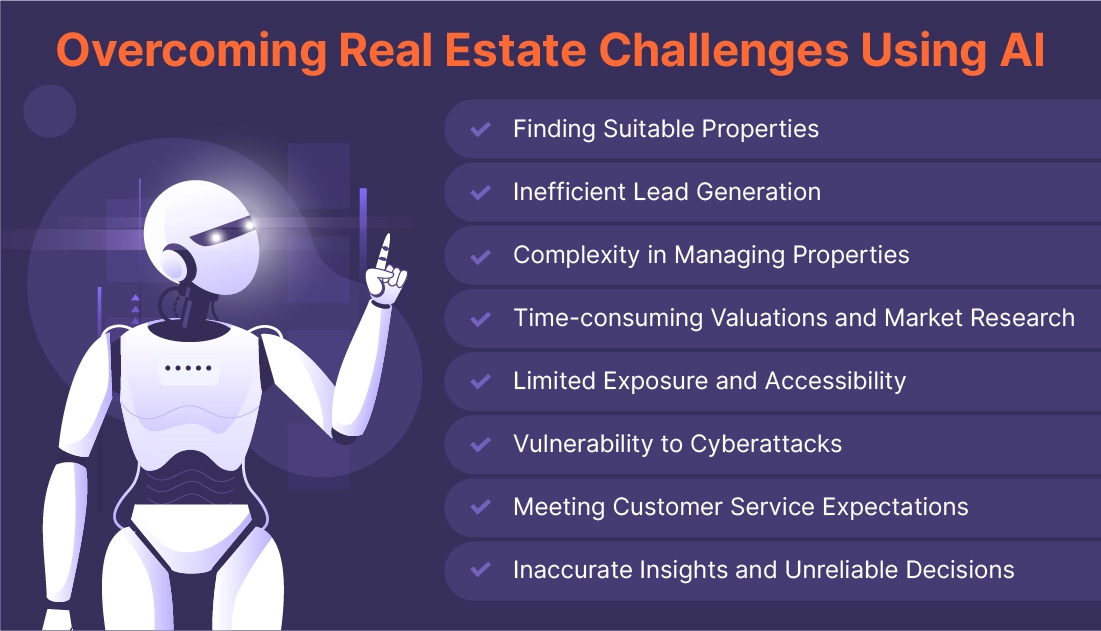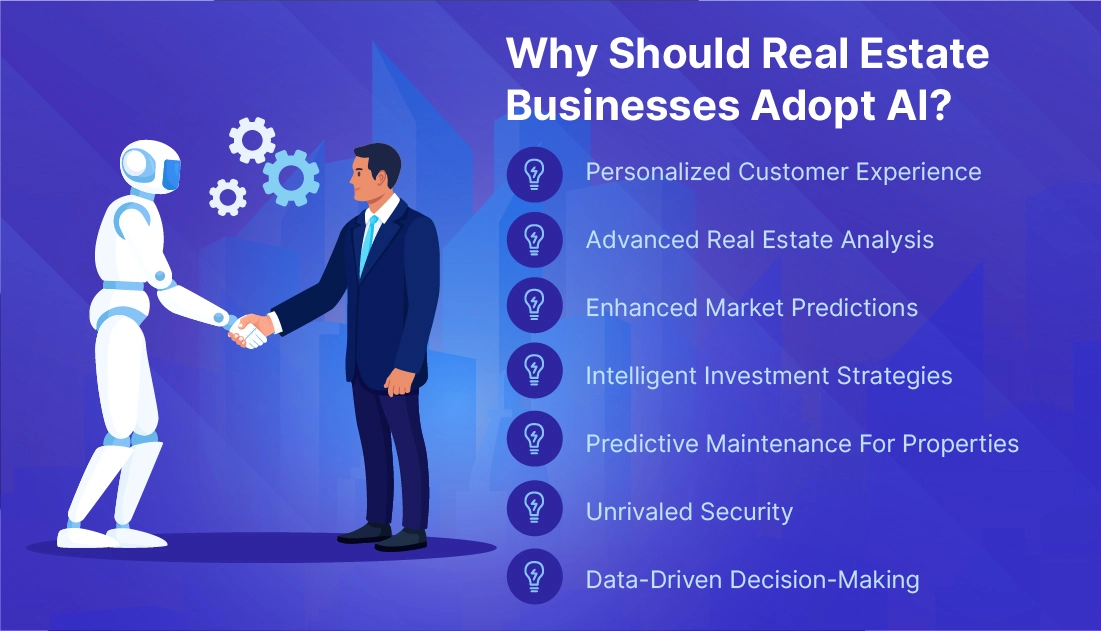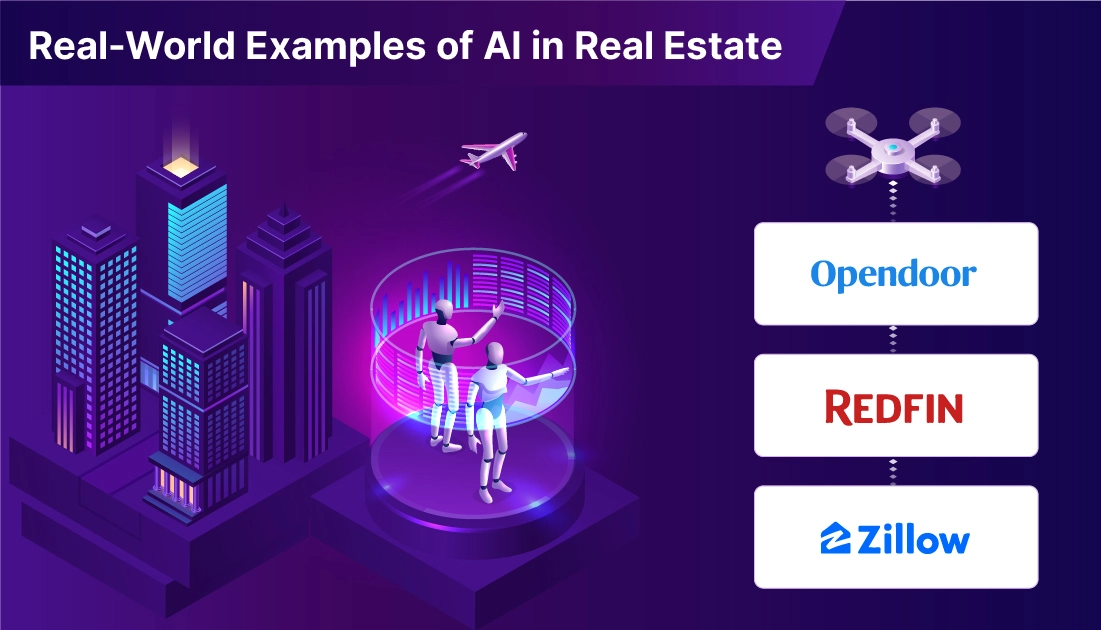Quick Summary
Explore the transformative power of AI in real estate, enabling automation, efficiency, and personalization to reshape the property landscape. From enhancing customer experience to automated property valuation, discover how AI adoption helps real estate businesses overcome numerous challenges. Dive into the blog post to know why embracing AI is the key to staying ahead of the curve, explore some real-world examples, and unlock the potential benefits of AI implementation in the ever-evolving real estate industry.
Table of Contents
Introduction
Imagine a real estate market transformed by artificial intelligence. No more endless property searches or tedious paperwork. AI is rapidly reshaping the industry, driving innovation, and streamlining processes at an unprecedented pace. The evidence? The use of AI in the real estate market is projected to skyrocket to a staggering $1335.89 billion by 2029 (It used to be $163.46 billion in 2022), fueled by a remarkable 35% compound annual growth rate. This explosive growth isn’t just a coincidence – it’s a testament to AI’s immense potential to revolutionize how we buy, sell, manage, and invest in properties. Get ready, the future of real estate is intelligent, and it’s arriving sooner than you think.
AI – isn’t some futuristic fantasy that is being chased by every industry. But it is the driving force behind revolutionizing the workflows, processes, and systems of many industries – the real estate industry is not an option. If you are indulged in the real estate industry and want to empower yourself and your team to deliver exceptional customer experiences, make data-driven decisions, and stay ahead of the curve – let’s take a deep dive into the transformative benefits of AI in real estate, explore how it tackles everyday challenges, and showcase real-world examples that are already changing the game.
AI in Real Estate: Overcoming Common Challenges
When we are talking about the real estate industry as a whole, it does face multiple challenges and roadblocks, hindering its success. However, the adoption of Artificial Intelligence in real estate can be a game-changer, allowing businesses to tackle the common hurdles they face. Let’s take a look at these common challenges and how AI helps overcome them.

Challenge #1 - Difficulty in Finding Suitable Properties
Searching through countless listings of properties to find the perfect one can be a daunting task for real estate agents as well as customers. Not being able to find a dream property is a time-consuming and frustrating process for many.
Solution – AI-powered Property Search
With AI-powered systems, it becomes easy and convenient to analyze vast amounts of datasets, including property listings, location details, ownership information, and buyer preferences. Using AI-based property search, real estate agents can get valuable insights to recommend highly relevant properties to their clients within a few minutes.
Challenge #2 - Inefficient Lead Generation
Traditional lead generation methods often lead to slow and inefficient outcomes. Yielding high-quality leads without consuming much time is challenging for any real estate business.
Solution – Smart Lead Generation Systems
Implementing smart lead generation systems into the real estate business helps identify and nurture qualified leads by leveraging advanced data analytics and AI algorithms. AI-powered systems can analyze user behavior, purchasing history, and online activities to differentiate between potential buyers and window shoppers, allowing real estate vendors to focus on high-quality leads.
Challenge #3 - Complexity in Managing Properties
Managing properties can be complex as it requires well-curated strategies and expert oversight. Property management involves a lot of tasks, ranging from rent collection to addressing maintenance requests.
Solution – AI-Driven Property Management
By employing AI solutions for property management, real estate businesses can streamline workflows and automate repetitive tasks, including maintenance scheduling, tenant screening, rent collection, lease renewals, and crafting property management plans. AI algorithms can also predict potential issues and roadblocks when implementing preventive measures for seamless property management.
Challenge #4 - Time-consuming Valuations and Market Research
Real estate companies always have to deal with delays in making decisions due to investing more time, effort, and resources in conducting thorough, time-consuming valuations and market research. Accurate property valuation also demands proficient expertise to stay updated with current market trends and customer requirements.
Solution – Automated Property Valuation
Utilizing the power of AI in the real estate industry, businesses can analyze vast amounts of data and get accurate estimations of properties through automated property valuation systems. Integrating AI and ML algorithms can help evaluate information related to recent sales, property features, market trends, future growth, and more, allowing businesses to make informed decisions and never miss potential opportunities.
Challenge #5 - Limited Exposure and Accessibility of Landholdings
Another challenge most real estate professionals face is limited exposure and accessibility of properties. It is often not possible to convince clients based on the images/videos of the properties or take them on a visit to vacant or underdeveloped properties.
Solution – Virtual Property Tours
With AI-powered virtual tours, real estate professionals can allow their potential customers to explore distinct properties remotely without any hassle of actually going to the location. Businesses can offer immersive virtual tours and experiences with 360° views of the property, showcasing details like floor plans, architecture, and other important features and information
Challenge #6 - Vulnerability to Cyberattacks
Due to the increasing vulnerability to rising cyber threats and online scams, it becomes difficult for real estate businesses to safeguard their sensitive client data and information and prevent fraudulent activities.
Solution – AI-Based Fraud Detection and Prevention
By integrating AI-based fraud detection and prevention systems, real estate businesses can strengthen their cybersecurity mechanisms and efficiently protect their sensitive data and transactions. AI systems can consistently monitor transactions, analyze patterns, and detect anomalies to identify and prevent real-time suspicious activities.
Challenge #7 - Meeting Customer Service Expectations
In today’s competitive marketplace, it becomes mandatory for real estate professionals to offer consistent, reliable, and personalized customer services to fulfill customers’ evolving demands.
Solution – Chatbot-assisted Customer Service
Fortunately, AI-based chatbots and virtual assistants can help real estate companies offer exceptional customer service. Integration of AI chatbots makes it easier to offer 24×7 assistance to address individual inquiries, schedule appointments, and provide a more personalized experience. These smart chatbots allow professionals to focus on other complex tasks that are necessary to enhance customer retention.
Challenge #8 - Inaccurate Insights and Unreliable Decisions
Many business owners unknowingly rely on outdated or incomplete data insights or information, resulting in wrong or misinformed decisions that are harmful to their business. These wrong decisions lead to missed opportunities, loss of revenue, and diminishing business growth.
Solution – Intelligent Data Processing
Leveraging the potential of AI, business owners can get accurate and updated data-driven insights extracted from analyzing a large number of datasets in real-time and predicting future outcomes. AI-powered data processing solutions offer precise data-driven insights, empowering real estate professionals to make informed decisions that yield positive results.
Let our AI consulting team guide you through the successful integration of AI solutions into your business processes
Why Should Real Estate Businesses Adopt AI?
As the real estate industry continues to evolve, leveraging cutting-edge technologies has become a necessity. Similarly, embracing artificial intelligence is no longer a choice, but a necessity for businesses interested in getting a competitive edge.
Here are some compelling reasons why real estate businesses are opting for implementing AI solutions into their operations.

Personalized Customer Experience
Real estate businesses can offer tailored services and offerings to their customers with the help of AI-driven solutions. AI algorithms can analyze user preferences and behaviors; thereby, allowing real estate professionals to offer customized property recommendations. With the use of AI-powered chatbots, real-estate consumers can expect round-the-clock support and solutions to their queries, leading to higher customer satisfaction and trust.
Advanced Real Estate Analysis
AI implementation can be helpful when you need to analyze mountains of datasets, including property features, market trends, and neighborhood demographics. With advanced AI-powered analysis, real estate agents and professionals can identify unexplored gems, suggest ideal investments, and offer detailed property insights to clients.
Enhanced Market Predictions
Stay ahead of market trends with AI-powered predictive analytics. With AI’s predictive analytics capabilities, businesses can get accurate insights and market trend predictions to make informed decisions, optimize their marketing strategies, and create pricing plans according to the expanding real estate landscapes.
Intelligent Investment Strategies
By leveraging AI algorithms, real estate investors can analyze historical data, market trends, and potential risks to optimize investment decisions for better growth. AI solutions can help automate the identification of investment opportunities, assessment of risk factors, and optimization of investment portfolios. Investors can develop intelligent investment strategies that facilitate maximized returns and minimized risks
Predictive Maintenance For Properties
AI-powered predictive analytics can help real estate businesses to proactively deal with maintenance issues by efficiently analyzing property data. By using AI in real estate, businesses can minimize downtime and reduce overall maintenance costs. The capabilities possessed by Artificial Intelligence in predictive maintenance are tremendous, as it efficiently addresses potential problems before they escalate.
Unrivaled Security
Real estate businesses often involve high numbers of digital transactions, making them the prime target of cybercriminals. Employing AI-powered cybersecurity tools and solutions can help ensure the security of your sensitive transaction and customer data. AI algorithms can accurately identify and prevent fraudulent activities, including data breaches, unauthenticated access, and other cyber threats.
Data-Driven Decision-Making
AI solutions empower business owners and decision-makers with actionable insights by analyzing vast data and information collected from diverse sources. Having accurate data insights by your side, you can make strategic decisions related to property investments, business growth, and customer targeting strategies.
Real-World Examples of AI in Real Estate
Integrating Artificial Intelligence in real estate companies is becoming vital for streamlining processes, personalizing interactions, and making data-driven decisions based on valuable insights. From employing AI-powered chatbots to automated property management systems, many real estate businesses are transforming their processes of buying, selling, and investing in properties. Let’s explore some real estate companies that are leveraging AI solutions to thrive in the competitive landscape.

Opendoor
Opendoor, a leading iBuyer company that buys and sells residential real estate online, leverages AI to offer the best possible seller experience. Opendoor analyzes customers’ behavior and preferences by employing computer vision and AI-driven modeling to optimize its pricing strategies. Their AI models evaluate customer needs based on a seller questionnaire that includes varied home conditions so they can give customized offers or services to each customer.
Redfin
Redfin is a real estate brokerage company that utilizes AI-powered insights to ensure a smoother, faster, and easier process of buying and selling homes online. The company utilizes the capabilities of AI to analyze market data, automate property valuations, and recommend tailored offer prices to customers and realtors.
Zillow
Zillow, a renowned American real estate marketplace company, employs next-gen AI technologies like deep learning, natural language processing, computer vision, and machine learning to estimate property values based on digital images, property location, and other metrics. Their Zestimate model analyzes vast datasets, including past sales, property features, and market trends, to offer an accurate property valuation to buyers and investors. This allows individuals to make data-driven decisions throughout the buying and selling process.
Who Can Unlock Benefits of AI Integration in Real Estate?
AI integration in real estate offers numerous benefits to a diverse range of stakeholders, from real estate agents to investors. Take a look at who can leverage the benefits of AI implementation.
Real Estate Agents: Real estate agents can utilize AI-driven tools to streamline operations and automate routine tasks. From transaction management to lead generation, real estate agents and brokers can use AI’s capabilities to enhance client interaction, optimize marketing efforts, and deliver personalized experiences.
Property Owners and Managers: With AI-driven property management solutions, property managers can automate tasks like tax collection, tenant screening, and maintenance scheduling. Moreover, AI can assist in anticipating potential maintenance issues and recommend preventative measures for smoother operations.
Investors: Investors can optimize their real estate investment strategy with AI-powered predictive analytics solutions. They can utilize the power of AI in real estate property assessment. Using AI tools helps investors analyze market trends, minimize potential risks, and provide actionable insights to make informed decisions and maximize their return on investment.
Homebuyers: Discover your perfect home effortlessly with AI-powered property search and recommendation systems. Buying a home is a crucial decision, and AI-powered solutions can assist you in finding a property that aligns with your preferences, lifestyle, and budget.
Sellers: AI provides sellers with efficient tools to facilitate faster and smarter selling of properties. From accurate property recommendations to targeted content creation, AI-based systems can empower sellers to showcase properties effectively and attract the right buyers.
Financial Institutions: Artificial Intelligence finds a variety of applications in financial institutions. From risk assessment to credit scoring and fraud detection to data analysis, AI helps financial institutions ensure efficient, secure, and seamless lending processes.
Hire AI Developers to build robust, secure, and scalable custom AI solutions tailored to your needs, propelling your real estate business toward success.
The Future of Artificial Intelligence in Real Estate
Artificial Intelligence (AI) has already made a significant impact on the real estate industry, with businesses employing future-proof technologies, such as machine learning, deep learning, big data, NLP, Robotic Process Automation, computer vision, and more. With the growing AI applications in real estate, it is not surprising to expect more transformative advancements in the future.
With AI steering the way, the future promises excellence to real estate businesses in hyper-personalization, workflow automation, property valuations, predictive analytics, and exceptional customer service. From image recognition to personalized property matching, AI will continue to redefine the real estate industry, making it more intelligent, innovative, and efficient.
Conclusion
The potential impact of using AI in real estate is enormous now and is expected to grow exponentially in the upcoming years. As explored in the blog post, by embracing AI, real estate businesses can win over numerous challenges and unlock a treasure of benefits. From streamlining workflows to improving user experience, AI empowers everyone in the real estate industry – professionals, agents, brokers, and investors.
By leveraging the potential of AI solutions, real estate businesses can automate repetitive tasks, optimize processes, and offer excellent customer service. Adopting AI in your real estate business isn’t just about gaining a competitive edge; it’s about shaping the future of real estate for the better by unlocking a new era of automation, efficiency, and personalization.
Frequently Asked Questions (FAQs)
Real estate businesses often face challenges, such as inefficient lead generation, inaccurate market analysis, complex property valuation, and managing a high volume of paperwork. However, by implementing AI solutions, real estate companies can efficiently tackle the challenges and excel at delivering exceptional real estate experiences.
AI has emerged as a game-changer for real estate businesses, facilitating automated property management, personalized customer experience, and extracting actionable insights from vast real estate datasets. AI helps real estate businesses achieve the following:
- Optimized lead generation
- Efficient property management
- Accurate market predictions
- Personalized customer interactions
- intelligent investment strategies
- Strong cybersecurity mechanisms
- Data-driven decision-making
Various stakeholders in the real estate industry, including agents, brokers, investors, and property managers, can leverage the potential of Artificial Intelligence for smarter decision-making and automated operations.
Here is a step-by-step process that real estate companies need to know for seamless AI implementation to streamline operations, enhance customer experiences, and enable data-driven decision-making.
- Identify and define areas where AI implementation can deliver maximum value.
- Get expert AI consultation from professionals to evaluate your existing business processes and create strategies for seamless AI implementation.
- Partner with a leading AI development company that can understand your specific business needs and swiftly integrate AI solutions into your existing workflows and systems.
- Make sure to discuss your vision and objectives clearly with AI developers so they can build tailored AI solutions for your real estate company.
- Provide essential training to make your team familiar with AI technologies and leverage their capabilities to enhance customer experience.
- Continuously monitor the performance of your custom AI solutions and modify/scale them as needed to gain a competitive edge.
Your Success Is Guaranteed !
We accelerate the release of digital product and guaranteed their success
We Use Slack, Jira & GitHub for Accurate Deployment and Effective Communication.





